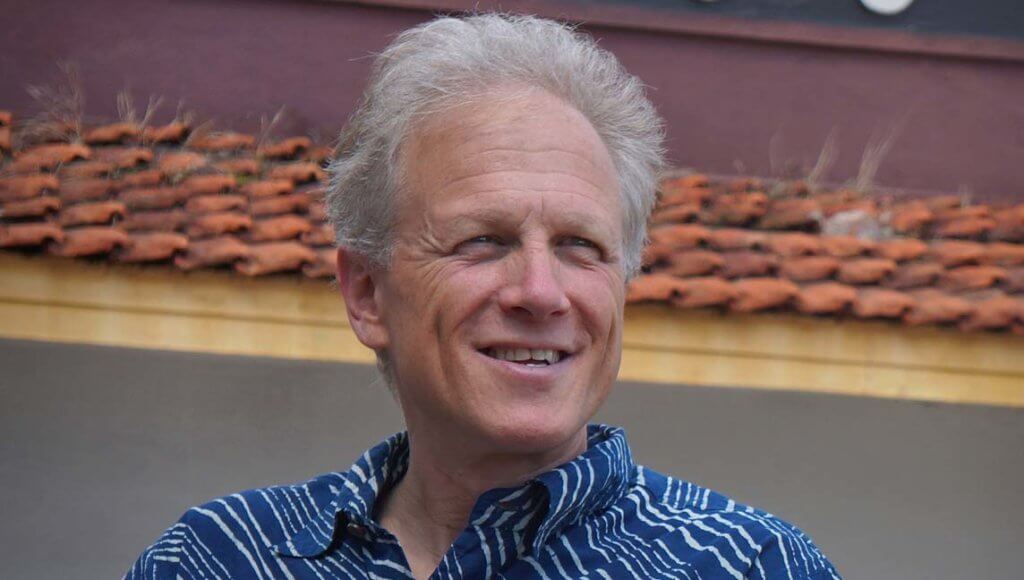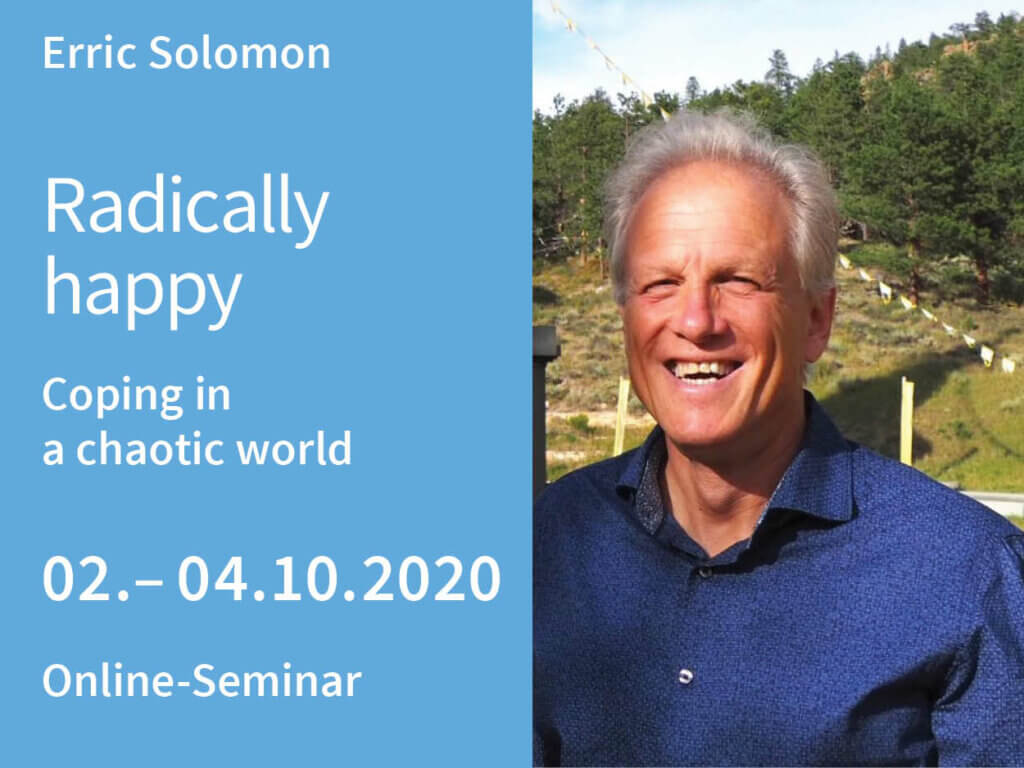A Radical Approach to Well-Being
by Erric Solomon

My teacher, Kyabjé Tulku Urgyen Rinpoche, spent more than two decades in retreat before he left Tibet for Nepal. He was really unlike anyone else I ever met, incredibly wise, selflessly kind, and incredibly skillful as a teacher. He was renowned for giving the “pointing out instruction” also known as the “introduction to the nature of mind,” the most important teaching you could receive in this human life. It was as if he simply described his own mind and skillfully invited you to see that it was also the essence of your mind.
Even though his mere presence was so extraordinary, he was down to earth, humble, and spoke very simply, yet with deep profundity. One of the most important things I heard him say was that the, “basis of our discontentment is the constant evaluation of the quality of our experience.” That simple phrase changed my life.
We are constantly evaluating everything that is happening, dividing all experience—no matter how trivial—into good and bad. And then we start to think about it, and then think about that in an almost endless torrent of thoughts. While it’s true that some things need our attention and require us to think them through, mostly we just do this on autopilot, because it is our habit. And this habit causes us a lot of misery.
So, the good news is that because it’s merely a habit that brings us so much dissatisfaction, we can do something about it. We can change this unhealthy dynamic just by making a slight, but radical shift in the way we view ourselves and the world around us.
What is Radical?
Radical literally means root, but also, radical has a sense of doing something that is counterintuitive. To be well within ourselves, we need to find the root of wellbeing and get to know it. That root is the basis of the mind. It’s the mind that is happy or sad, jealous or joyful, angry or loving.
Another teacher of mine, Nyoshul Khen Rinpoche would often use a special metaphor to explain our predicament. It’s called the difference between a lion and a dog. When you throw stones at a dog, it chases the stone. This is how we are with our thoughts and emotions. We chase every thought and emotion and play with, think about it, get into it. On the other hand, if you throw stones at a lion, he doesn’t care about the stones at all, he turns to look at where the stones come from.
We spend our whole life preoccupied with our stones—our thoughts and emotions. We never even look at the source of the thoughts and emotions, the mind itself, the awareness that knows the thoughts and emotions. So learning how to first stop habitually chasing our stones, and then to learn to look at the stone thrower, awareness, that is just as radical an activity today as it was 2,500 years ago when Buddha first discovered it.
How to Stop Chasing Stones
The first step is to get used to refraining. Refrain from what? Refraining from habitually chasing our stones—the thoughts, emotions and sensations that arise in our mind. We do this by giving our mind something else to do. It can be as simple as placing our attention on our breath, or placing our attention on the needs of others. We get used to placing our attention on something, and then being mindful that our attention stays where we put it.
In the beginning, it seems almost impossible, our mind seems to jump all over the place, and we keep forgetting to bring it back. Gradually, by doing this again and again, every day, we get used to it, and it gets easier and easier. In this aspect, it doesn’t matter if you do sitting meditation, tonglen, ngondro, or sadhana practice, the principal is the same: remain stable by lightly placing, in the face of whatever thoughts, emotions or sensations arise in your mind.
Placing our attention on the needs of others
Placing our attention on the needs of others is an incredibly vital approach to stopping chasing our thoughts, emotions and sensations, the Dalai Lama calls this approach “enlightened self-interest”. The more we can feel loving towards others, the more we relax our habitual preoccupation with the “constant evaluation of the quality of our experience”— the source of so much of our dissatisfaction.
A Buddha’s compassion radiates limitlessly without bias. When the sun shines, it shines without any notion of “I will shine today”. It is an inherent property of the sun. In the same way, so shines a Buddha’s love.
We have the exact same possibility to radiate love and compassion without partiality. Learning how to enable our compassion to blaze forth is the foundation of becoming a healthy, emotionally well-integrated human-being. This healthy sense of self is an important stepping stone for meaningful spiritual progress. By continuously remembering to ignite little sparks of love, kindness and care in our lives, we create the conditions for our infinite capacity for wisdom imbued with love to be uncovered.
How to experience unconditional love? My teachers often suggested that we start by focusing on all the little loves in our life. These are the sparks of unconditional love, trying to break through our self-imposed limits. We are not tiny individuals, but a part of a limitless interweaving within a great incomprehensible loving field of awareness. These little sparks of love are helping us wake up.
Even though we have had to endure trauma and heartache, our lives are informed by unconditional love. We wouldn’t be here if someone didn’t feed us when we were an infant, take us to a healer when illness struck or place a blanket on us when it was cold. Mentors in our lives taught us valuable things, perhaps a trade, or enriched our spiritual life.
Usually, when we try to think of people that have supported us, our mind immediately goes to all the slights, insults and wrongs we have had to endure. This is why we don’t experience the unconditional love of the universe, the unconditional love that is our true nature. Our habits prevent us.
Instead, each day, as soon as you awake, try to recall someone who offered you kindness and care. Write it down. Gradually you’ll get better at it. After a time, no matter how difficult your life has been, you’ll recall more and more people who touched your life with kindness, care and love. They don’t have to have been perfect, but they cared.
These are the sparks of love, that are accumulating, trying to awaken us to our true nature, loving awareness. By remembering them, honoring them, being grateful to them, the universe will gradually reveal itself and the truth of who we really are will be realized.
Generosity: Create sparks of love, through letting go
Letting go is a kind of generosity, a major dose of self-care. Clinging to thoughts, emotions and sensations is a subtle form of stinginess, trying to keep something. The weird thing is that we are clinging to something that can’t really be held onto anyway. If we generously allow the thought or emotion the space to just be, without trying to maintain it or chase it away, it can’t cause any trouble at all.
So we practice inner generosity by dropping inner miserliness, the clinging that is the root of all our trouble. But it is important to practice outer generosity as well. Outer generosity strengthens the inner and vice versa. Outer generosity means being fully present and available to others, especially their needs.
When you have inner generosity and outer generosity, there is no clinging to a result. It’s the most powerful way to give, care for yourself and care for others. Letting go uncovers the naturally aware love that is the basis of everything.
Patient Spaciousness as the basis for accumulating sparks of love
Anger is the antithesis of love. When we are angry, we risk hurting others, but for sure we are a victim. Freedom comes from accumulating sparks of love, anger goes in the other direction. When we are angry, we won’t progress on the spiritual path, we will be miserable, and we may lose sight of what we value most.
Patience overcomes anger. When we are patient, though anger may flare, we don’t act; we patiently wait. Patience comes from spaciousness. In spaciousness, a little anger can arise, but it’s a little ripple in the limitless space of our awareness—it can’t overwhelm. Inner spaciousness leads to outer patience; outer patience gives us the freedom to choose our actions rather than react out of habit.
Our mind is naturally spacious, but we become focused on the reasons for anger instead of the space that the anger arises within. When we focus on the reasons, we lose the space. So, again and again, remind yourself of the naturally spacious mind by taking mini-breaks throughout the day. Just sit for a moment or two and feel your breath.
From spaciousness, comes patience. Both are bigger than anger. Without anger, our sparks of love will flow.
No moment of love, kindness, care and compassion is too small. Through the power of letting go and spaciousness, your natural limitless capacity for unconditional love becomes more and more available. Don’t worry if in the beginning you can’t do it for everyone, or you can’t do it all the time. Celebrate the sparks you ignite and you already create the auspicious conditions for more to arise. It’s radical; look inside and the outside world transforms.
Looking at the Stone Thrower
Having gained a degree of stability, our mind is more calm, more flexible. Then we can begin to investigate, who is having the thought. Who knows the thought? Like a lion turning to look at the stone thrower, we turn to look at our stone thrower, the essence of mind itself.
Let’s say if you are the stone thrower and the lion turns to look at you, what happens next? There are exactly two possibilities:
You run away
You get eaten
In other words, the source of the stone disappears and there are no more stones. Tulku Urgyen Rinpoche said all the time, “Don’t look at the thoughts, look at what thinks!”
Getting to know your mind
Take a moment to investigate your mind. As an example, let’s say you are feeling anxious. How do you know you are anxious? At first, this might seem like a question that is so obvious it isn’t worth asking— the mind knows that it is experiencing anxiety. That knowing quality of mind, does it know the anxiousness better or worse than when it knows that you feel relaxed and peaceful? The more we investigate, the more familiar we become with the aware quality of mind that defines being sentient. The quality of awareness that knows panic isn’t different from the knowing of peace. In other words, we can see that our awareness is not harmed or enhanced by that of which we are aware. Isn’t that a comfort? Seeing that the mind is never really harmed by even the worst thoughts and emotions is our first step into becoming like a lion.
Du willst mehr über Errics radikalen Ansatz zum Glücklichsein erfahren? Dann sichere Dir jetzt noch schnell einen Platz für das Online-Seminar „Radically happy – Coping in a chaotic world“ vom 02. – 04.10.2020.




